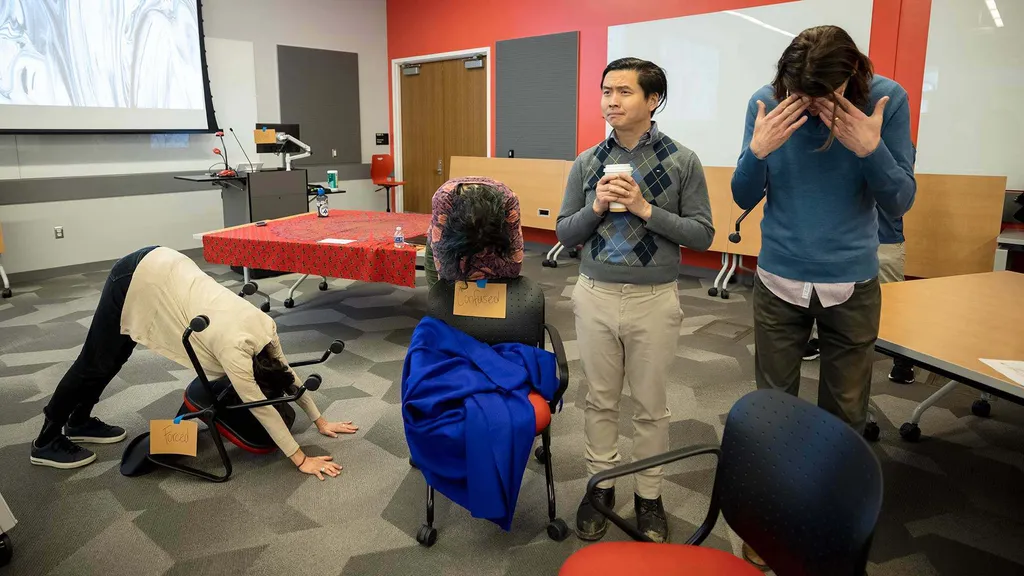- April 12, 2023
- By Emily Schuster
A faculty member reclined under a table. Another instructor struck a yoga pose over an upturned chair. A third hugged a whiteboard. Don’t worry; they weren’t cracking from stress. The words on a big screen behind them—“You cannot be wrong when you create!”—were a clue that something a little more theatrical was going on here.
The nine University of Maryland instructors were participating in a new workshop hosted by the College of Education and Teaching and Learning Transformation Center (TLTC) that used improvisation and theater games to help them become more playful and inventive in their teaching.
Many people see play as something that doesn’t belong in “serious” education settings, said co-facilitator Christine Alexander, a master’s student studying teacher education and professional development. But research has shown that far from being a frivolous distraction, play can make teaching and learning more meaningful, engaging and successful.
“Fun experiences tend to be memorable experiences. Creative teaching is effective teaching,” Alexander said. “Creativity is mythologized as something that belongs to an elite class of people, but I believe that everyone is creative.”

She’s led similar workshops for secondary education preservice teachers and instructors in the College of Education, post-docs, Maryland Promise Program scholars and students at the university’s Academy for Innovation and Entrepreneurship. This new workshop with Mona Thompson, senior education development specialist in the TLTC, builds on their collaboration working with preservice teachers, which was funded by a TLTC Teaching Innovation Grant and is the subject of Alexander’s master’s thesis. Alexander will be facilitating a shortened version of this workshop at the Innovations in Teaching & Learning Conference at UMD’s Edward St. John Learning and Teaching Center on May 12. Both Alexander and Thompson have backgrounds in improvisation, theater and education.
At the start of the activity, the participants worked together to place words like “learning,” “fun,” “interactive,” “challenged,” “forced” and “confused” in unexpected places around the room. (“Social” was nestled between bags of chips in a large bowl, and “skeptical” was taped to a chair set back from the others.) Next, Alexander and Thompson read aloud a series of sentences such as “In designing instruction for my classes, my first priority is…” and “Students often leave my class feeling…” Each sneaker-clad instructor ran to the word that they thought best completed the sentence and froze into a position that embodied their reaction to that word. Participants then paired up to talk about which words they had chosen or avoided and to start setting goals for integrating play and creativity into their classrooms.
Aria Heidarian, a lecturer in the physics department, was inspired to think about how to engage students in using multiple senses when learning about physical phenomena. She said that using play can help build students’ confidence in classes that might otherwise be intimidating.
“Students often walk into the physics classroom with a mindset that this is difficult and maybe they’re not smart enough for this. Our mission is to break that false image of what they’re capable of,” said Heidarian. “One of the challenges for us is to make the learning environment fun and playful and invite students to be more present.”
Later in the workshop, the participants wrote reflections on their own experiences with play as children and adults and started drafting lesson plans that invite students to use their imaginations, their voices, their whole bodies and all their senses while building social connections to one another.
“Play creates a safe space where you can drop your ego, try something new and reflect on yourself in a different way,” said Thompson. “It’s possible to learn new things about yourself because it feels very supported, comfortable and fun.”
David Tomblin, senior lecturer in the A. James Clark School of Engineering and director of College Park Scholars’ Science, Technology and Society program, plans to use the techniques he learned in the workshop to help students slow down and explore different ideas. “It gave me a chance to start working on an idea I’ve had about trying to get students to feel comfortable wandering, being creative and finding things they wouldn’t have expected to find,” he said.
As the workshop came to a close, and the participants buzzed with new ideas and animated conversations, Alexander and Thompson called them back together to engage in one last reflection. Standing in a circle, they shared their one-word takeaways from the experience: Play. Explore. Agency. Awe. Renewed.
Topics
Campus & CommunityTags
Student ExperienceUnits
College of Education